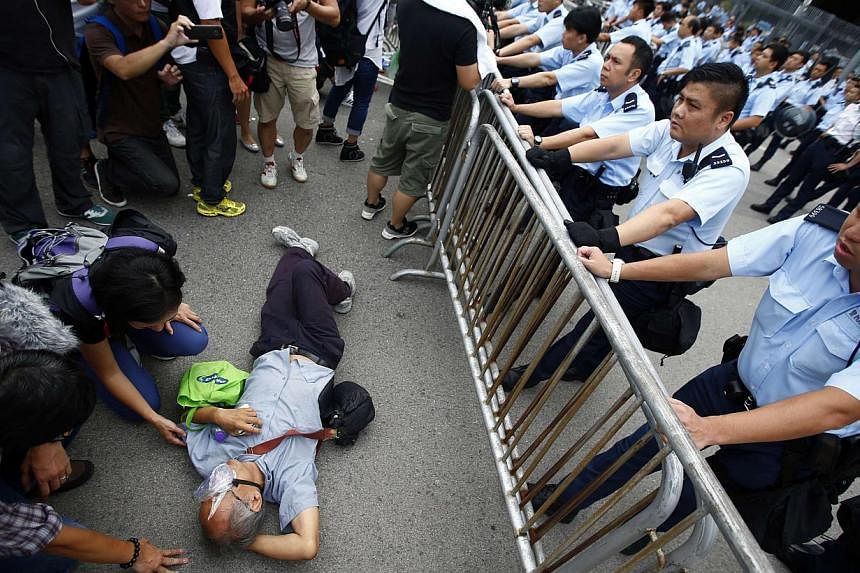Even as the Hong Kong government and protesters play a waiting game of seeing who blinks first, there are some who are urging that the two sides talk, amid risks that the ongoing stalemate could be volatile while hurting the economy.
One of the mediators is former secretary of security Regina Ip, now a member of the executive council, who tells The Straits Times on Thursday morning that she is trying to broker a forum between five representatives on each side "to talk over all the issues" but without setting any pre-conditions.
On whether Chief Executive Leung Chun Ying is agreeable to this, she says that he has been informed and that his advisors have urged him to attend such a dialogue.
"But of course there cannot be any pre-conditions for any resignations," she says.
It is unclear if the protest organisers will be amenable to this. Student leader Alex Chow had stated earlier that Mr Leung's stepping down must be a first step for any negotiations to begin.
His group, the Hong Kong Federation of Students (HKFS), had also laid down an ultimatum, calling for Mr Leung to resign by end of Thursday - or face the prospect of an escalation of civil disobedience.
It said that this would include mobilising people to occupy or surround government buildings.
But they will not take over places such as hospitals or fire stations, said HKFS vice-secretary Lester Shum.
Mrs Ip says that she is worried about the prospects that the protests, currently largely peaceful, could turn violent.
"I'm worried from some messages posted online, where people are trying to provoke a Tiananmen in Hong Kong, and forcing the PLA (People's Liberation Army) to come out. If that happens, in the eyes of the world, this is the end of the 'one-country, two-systems' policy."
She adds that a prolonged protest will also hurt the economy, noting that this is the longest protest that Hong Kong has seen to this.
"This is unprecedented," she said.
Just after midnight on Wednesday, HKFS led a group of about 30 protesters to occupy the area right outside Mr Leung's office, sitting in beyond metal barriers, as "a form of rehearsal", said Mr Chow.
The police subsequently stepped up its presence there.
The protesters' upping of the ante appears to be a counter to the government's strategy to wait out the protesters, until fatigue or societal backlash force them to retreat from the roads that they have occupied the past four days.
Since Sunday when the police had used tear gas on protesters in a heavily criticised move, the government has visibly dialed down police presence, while giving protesters free rein to organise themselves - including setting up a new sit-in site in Tsim Sha Tsui on Wednesday.
Mr Leung had also sought to underline the social and economic costs of the movement. Police officials have recounted how the road blockades were impeding emergency services for those requiring medical help.
On Wednesday, Beijing's top representative in Hong Kong Zhang Xiaoming affected a dismissive air when asked about the protests, a seeming indication that the central government could be keeping a hands-off attitude - for now.
"The sun still rises," he said.
But the rhetoric from Chinese state media on Wednesday was sharper, with official mouthpiece People's Daily terming Occupy Central's actions as "confrontation".
"A minority insist on opposing the rule of law and provoking incidents. They will have to face the consequences," it wrote.
Such warnings had little effect in Hong Kong on Wednesday where crowds swelled even larger on National Day, a public holiday.
The mood at Causeway Bay was even festive, with newlyweds taking wedding photographs amid the protesters.
Over at the main protest site at Admiralty, gigantic images of encouraging messages from around the world were projected on the wall facade of the government headquarters.
"The whole world is learning true democracy from you," goes one, from Japan.

